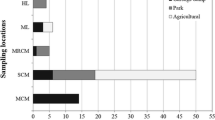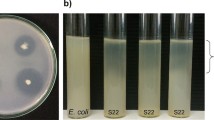Abstract
Thermophilic actinomycetes strains were isolated from various environment in Taiwan and screened for degradation of poly(ethylene succinate) (PES), poly(ε-caprolactone) (PCL) and/or poly(β-hydroxybutyrate) (PHB) by the clear-zone method. Out of 341 strains of thermophilic actinomycetes, 105 isolates were PHB-degraders (30.8%), 198 isolates were PCL-decomposers (58.1%), and 99 isolates could degrade PES (29.0%). Furthermore, 77 isolates could degrade both PHB and PCL (22.6%), 35 isolates could degrade both PHB and PES (10.3%), 81 isolates could degrade both PES and PCL (23.8%) and 31 isolates could degrade the three polyesters used in this study (9.1%). Base on the morphological and chemical characteristics, these 31 isolates belonging to Actinomadura (12.9%), Microbispora (25.8%), Streptomyces (48.4%), Thermoactinomyces (9.7%) and Saccharomonospora genus (3.22%).
Similar content being viewed by others
Abbreviations
- PES:
-
polyethylene succinate
- PCL:
-
poly(ε-carpolactone)
- PHB:
-
poly(3-hydroxybutyrate)
References
Calabia BP, Tokiwa Y (2004) Microbial degradation of poly (D-3-hydroxybutyrate) by a new thermophilic Streptomyces isolate. Biotechnol Lett 26:15–19
Hasegawa T, Takizawa M, Tanida S (1983) A rapid analysis for chemical grouping of aerobic actinomycetes. J Gen Appl Mcirobiol 29:319–322
Hoang KC, Tseng M, Shu WJ (2007a) Degradation of polyethylene succinate (PES) by a new thermophilic Microbispora strain. Biodegradation 18:333–342
Hoang KC, Lee CY, Tseng M, Chu WS (2007b) Polyester-degrading actinomycetes isolated from the Touchien River of Taiwan. World J Microbiol Biotechnol 23:201–205
Ikura Y, Kudo T (1999) Isolation of a microorganism capable of degrading poly-(L-lactide). J Gen Appl Microbiol 45:247–251
Jarerat A, Tokiwa Y (2001) Degradation of poly(tetramethylene succinate) by thermophilic actinomycetes. Biotechnol Lett 23:647–651
Jendrossek D (2001) Microbial degradation of polyesters. In: Scheper T (ed) Biopolyesters. Advances in Biochemical Engineering /Biotechnology. Springer-Verlag, Berlin, pp 293–325
Kleeberg L, Hetz C, Kroppenstedt RM, Müller RJ, Deckwer W -D (1998) Biodegradation of aliphatic-aromatic copolyesters by Thermomonospora fusca and other thermophilic compost isolates. Appl Environ Microbiol 64:1731–1735
Kohei N, Toshio T, Naoki A, Yoshiyuki K (2001) Purification and charaecterization of an extracellular poly(L-lacticacid) depolymerase from a soil isolate, Amycolatopsis sp. strain K104-1. J Gen Appl Microbiol 67:345-353
Pranamuda H, Tokiwa Y (1999) Degradation of poly(L-lactide) by strains belonging to genus Amycolatopsis. Biotechnol Lett 21:901–905
Pranamuda H, Tokiwa Y, Tanaka H (1997) Polylactide degradation by an Amycolatopsis sp. Appl Environ Microbiol 63:1637–1640
Sanchez JG, Tsuchii A, Tokiwa Y (2000) Degradation of polycaprolactone at 50°C by a thermotolerant Aspergillus sp. Biotechnol Lett 22:849–853
Takeda M, Koizumi J, Yabe K, Adachi K (1998) Thermostable poly (3-hydroxybutyrate) depolymerase of a thermophilic strain of Leptothrix sp. isolated from a hot spring. J Ferment Bioeng 85:375–380
Tansengco ML, Tokiwa Y (1998) Thermophilic microbial degradation of polyethylene succinate. World J Microbiol Biotechnol 14:133–138
Tansengco ML, Dogma IJ Jr. (1998) Comparative population study of aliphatic polyesters-degrading microorganisms at 50°C. Chem Lett 1043–1044
Tokiwa Y, Calabia BP (2004) Degradation of microbial polyesters. Biotechnol Lett 26:1181–1189
Tokiwa Y, Pranamuda H (2001) Microbial degradation of aliphatic polyesters. In: Doi Y, Steinbuchel A (eds) Biopolymers. vol 3. Weinheim: Wiley-VCH, pp 85–103
Tokiwa Y, Iwamoto A, Koyama M, Kataka N, Nishida H (1992) Biological recycling of plastics containing ester bonds. Makromolekulare Chemic-Makromolecular Symposia 57:273–279
Acknowledgments
This research was supported partially by the Ta-Hwa Institute of Technology and Ministry of Economic Affairs, R. O. C. (project no. 93-EC-17-A-17-R7-0525). We also thank Mr. J. H. Chiou and Mr. Y. K. Lin for assistance in samples collection.
Author information
Authors and Affiliations
Corresponding author
Rights and permissions
About this article
Cite this article
Tseng, M., Hoang, KC., Yang, MK. et al. Polyester-degrading thermophilic actinomycetes isolated from different environment in Taiwan. Biodegradation 18, 579–583 (2007). https://doi.org/10.1007/s10532-006-9089-z
Received:
Accepted:
Published:
Issue Date:
DOI: https://doi.org/10.1007/s10532-006-9089-z




